Search Results
Showing results 1 to 15 of 15

Low-Tech Water Filter for High-Impact Clean
Source Institutions
In this activity, learners consider the water features they might enjoy at a community park--a pond, brook, water playground (or "sprayground"), or pool--and what happens to the water over time.
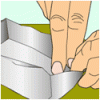
Aluminum Boats
Source Institutions
Test the buoyancy of an aluminum foil boat and an aluminum foil ball. Why does the same material in different shapes sink or float?
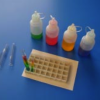
The Liquid Rainbow
Source Institutions
Learners are challenged to discover the relative densities of colored liquids to create a rainbow pattern in a test tube.

Exploring Science Practices: Early Explorations
Source Institutions
This activity gives caregivers and their children an opportunity to practice scientific ways of thinking that are developmentally appropriate for early learners.
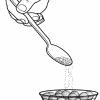
Inner Space
Source Institutions
In this activity, learners discover that there is space between molecules even in a cup "full" of water. They first fill a cup with marbles, and then add sand to fill the gaps between the marbles.
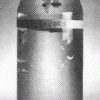
Divers
Source Institutions
Learners experiment with a 2-liter plastic bottle containing water and four “divers." The divers consist of open, transparent containers with the opening points downward.
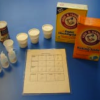
Which Powder is It?
Source Institutions
In this chemistry challenge, learners identify an unknown white powder by comparing it with common household powders.
Making An Impact!
Source Institutions
In this activity (on page 14 of PDF), learners use a pan full of flour and some rocks to create a moonscape.
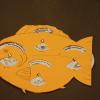
Fish Wheels
Source Institutions
In this activity, learners cut out and assemble wheels to explore how variations in fish body structures (mouth shape/position/teeth, body shape, tail shape, and coloration patterns) allow fish to sur

Liquid Body Armor
Source Institutions
In this activity, learners explore how nanotechnology is being used to create new types of protective fabrics.
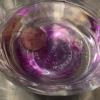
Candy Chemistry
Source Institutions
In this experiment, learners test multiple food items to see if they are an acid or base using an indicator solution created with red cabbage.
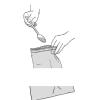
Matter of Degree
Source Institutions
In two separate bags, learners mix water with Epsom salts and detergent.
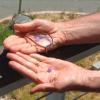
Exploring Ultraviolet (UV) light from the Sun
Source Institutions
In this outdoor activity, learners explore UV rays from the Sun and ways to protect against these potentially harmful rays.
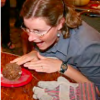
Cook Up a Comet
Source Institutions
In this activity (on page 5 of PDF), learners use dry ice and household materials to make scientifically accurate models of comets.
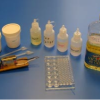
Carrying Charges: Testing for Conductivity
Source Institutions
Learners are challenged to create solutions that conduct electricity and make a buzzer buzz (or an LED light up).
